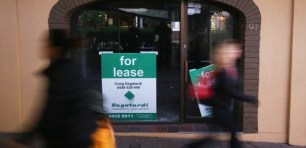
Extended house price falls as the COVID-induced economic downturn bites would damp economic growth, given Australian’s heavy reliance on property markets for wealth generation.
But falling rates of business ownership in the country may be a bigger threat to growth.
The latest Household, Income and Labour Dynamics in Australia (HILDA) Survey of 17,000 Australians shows that COVID-19 has hit at a time when net household wealth — the value of assets less any debt owed — had been growing strongly.
Since 2014, median household wealth rose more than 17% to almost $504,000 in 2018 (measured in 2018 dollars). That compares with a 5% fall in median wealth between 2006 and 2014, following the end of the mining boom and the onset of the global financial crisis.
But about half of average Australian household assets are held in the value of the home, accounting for an average $509,000 out of a total average household assets of $1.1 million.
And that is despite one-third of householders not being home-owners.
On average, a further $161,000 is held in investment property and holiday homes — about 21% of Australian households have an investment property and/or holiday home.
In contrast, the proportion of households owning a business has dropped from 13% in 2006 down to less than 10% in 2018, and the average value of these businesses has shrunk from $65,000 to $44,000.
“We seem to have to an over-reliance on property when it comes to pursuing wealth in Australia, and that isn’t ideal for the economy,” said HILDA Survey leader Professor Roger Wilkins from the University of Melbourne.
He says that while a looming fall in house prices in the wake of COVID-19 would, in the short term, be a drag on the economy given how important housing is to the wealth of Australians, he says lower house prices would actually be a positive in the longer term.
“A step-down in house prices to a lower level would be in the interests of the broader community as it would broaden home-ownership, especially for younger Australians who have been shut out by high prices,” he says.
“It would also be good if more of the community could find other ways to increase their wealth rather than focusing on property.
“The idea of creating and building a business idea is pretty alien to Australia’s investment culture, and that isn’t good for generating economic growth.
“Ideally, you want people to feel they can get ahead by doing something productive, like producing and innovating products and services that people want, which can increase economic output.”
But Wilkins says he’s concerned the pandemic downturn will hurt small businesses especially hard.
“Small businesses tend to be disproportionately in sectors like hospitality, recreation and the arts that have all so far been cruelly hard-hit by the downturn and the social restrictions aimed at controlling COVID-19.”
This article was first published by Pursuit.
Handpicked for you

To what extent will workers return to offices? And what could this mean for Melbourne’s CBD?



COMMENTS
SmartCompany is committed to hosting lively discussions. Help us keep the conversation useful, interesting and welcoming. We aim to publish comments quickly in the interest of promoting robust conversation, but we’re a small team and we deploy filters to protect against legal risk. Occasionally your comment may be held up while it is being reviewed, but we’re working as fast as we can to keep the conversation rolling.
The SmartCompany comment section is members-only content. Please subscribe to leave a comment.
The SmartCompany comment section is members-only content. Please login to leave a comment.